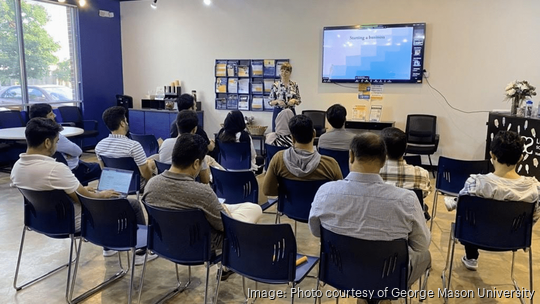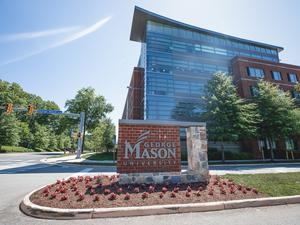
Buoyed by a $1.5 million donation from a local tech executive, George Mason University is launching a training program for aspiring entrepreneurs from refugee and immigrant backgrounds, the first phase of its inclusive entrepreneurship training initiative.
The donation from Sumeet Shrivastava, former president and CEO of government technology services firm Array Information Technology Inc., will fully fund the RISE (Refugee and Immigrant Success through Entrepreneurship) Program at GMU, the largest public university in Virginia.
The RISE program, which kicks off Saturday, will run for 11 months and target aspiring entrepreneurs who are refugees or immigrants. As part of its broader inclusive entrepreneurship initiative, GMU also plans to run future programs geared to students from low-income households and rural or underserved communities.
Rebecca Howick, the director of operations at GMU’s Center for Innovation and Entrepreneurship (CIE), said the initiative is its way for the university to live up to its "Mason Virginia Promise," which says every student should have a guaranteed pathway to either a bachelor's degree or the ability to start a business.
“The initiative is more the concept itself of trying to provide inclusive entrepreneurship education,” said Howick.
The program follows the framework of the Notre Dame Urban Poverty Business Initiative and will include six weeks of entrepreneurship training, 12 weeks of mentoring and then 13 weeks of consulting classes with honors college business students at GMU to help the participants hone their business plans.
Crystal Fickers, CIE program manager and instructor says RISE is an opportunity to change participants' lives.
“In a decade of training refugee and asylum seekers in entrepreneurship and workforce development, I've seen firsthand the transformative power of entrepreneurship education,” said Fickers. “It's not just about creating businesses; it's about empowering individuals and revitalizing communities. I'm excited to bring this level of support and opportunity to the vibrant and diverse communities of the DMV region."
Howick expects at least 35 participants to be in the program this year. There’s a $600 fee to participate but if a candidate proves that the the fee is a barrier to access it can be reduced to $25.
Lutheran Social Services of the National Capital Area (LSSNCA) is also a partner in the program. Its focus is on making sure participants have stable housing, food security and other essentials and it will work with employment coordinators to assist help participants land full-time employment.
The CIE is currently looking for philanthropic partners and grants to fund future programs aimed at low-income individuals. When that funding is found it’ll open applications for the next cohort.
